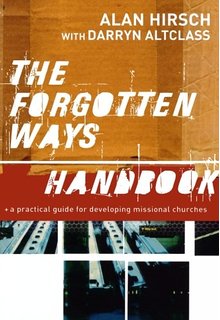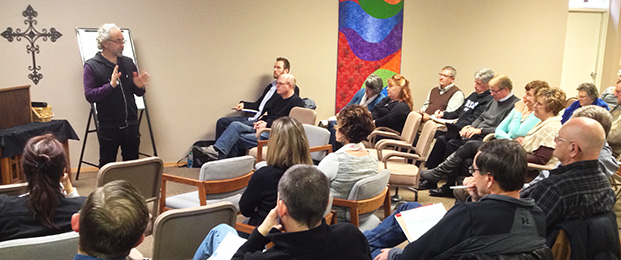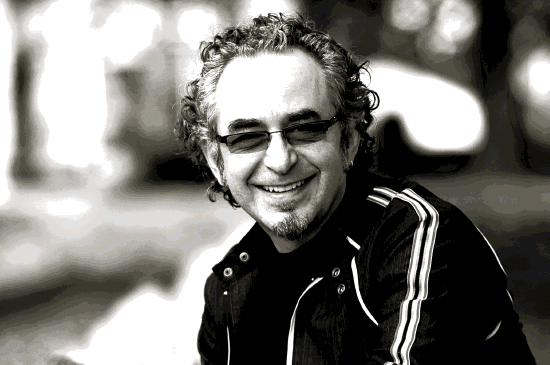
Becoming like Jesus is your agenda for life: Alan Hirsch @ DWU
From Eric Van Meter, campus pastor at Dakota Wesleyan University
“If you want a clue as to how to move forward, you can find everything you need in your history.”
 Perhaps that is a surprising statement coming from Alan Hirsh, the missiologist and author best known for The Forgotten Ways. Virtually everything he writes looks forward through the lens of the distant past, trying to discern the path ahead for the church by examining how the first generations of Christians approached discipleship. But during his visit to Dakota Wesleyan University last week, Hirsch zeroed in on Methodists in particular during conversations with students and clergy.
Perhaps that is a surprising statement coming from Alan Hirsh, the missiologist and author best known for The Forgotten Ways. Virtually everything he writes looks forward through the lens of the distant past, trying to discern the path ahead for the church by examining how the first generations of Christians approached discipleship. But during his visit to Dakota Wesleyan University last week, Hirsch zeroed in on Methodists in particular during conversations with students and clergy.
“In the first half of the nineteenth century, no one did Christian movement like the Methodists,” Hirsch said. “You had a clear system of discipleship through classes and bands, you were primarily a lay movement in which everyone was expected to be invested, and you were organizationally nimble. You had all the makings of a movement.” And now? Not so much.
As I listened to Alan speak, I couldn’t help but think how differently we function now than in our early days in North America. The United Methodist Church is among the most hierarchical of Protestant denominations, with methods of discipleship that vary widely from congregation to congregation. We have one of the most educated clergy class in history, yet we ask them to function within a narrow field of practice that may not always suit their gifting.
 Photo: Alan Hirsch addressing Dakotas clergy and laity in Mitchell.
Photo: Alan Hirsch addressing Dakotas clergy and laity in Mitchell.
“The Western Church has no tradition of dissent,” Hirsch said. “We have demanded conformity.” This is particularly noticeable among those called pastors, Hirsch notes. In his view, the church has rewarded shepherds and teachers, who offer stabilizing gifts. Those whose giftings bring change or agitation—apostolic organizers, evangelists, and prophet/activists—are often walled out.
The result is a malformed representation of the body of Christ. We are incomplete, often unable to see what is ahead or understand how to connect with our non-Christian neighbors because those best equipped to do so find no place at the table. And so churches scratch for a share of the Christian marketplace, but struggle to reach outside our comfortable boundaries.
It’s a difficulty that Rebecca Trefz, Dakotas Conference Director of Ministries, struggles with every day. “Many of us have grown up knowing how to make good church members but not necessarily how to make disciples,” Trefz said. “Our discussions with Alan reminded me how, if we miss that—if we don’t get to the heart of that—we will struggle with developing leaders and revitalizing congregations and communities.”
If this is an accurate diagnosis of our problem, what is our solution? According to Hirsch, it begins and ends with Jesus. “Becoming like Jesus is your agenda for life,” he said. With a few days now to ponder all that we at DWU and the Dakotas Conference learned from Alan’s visit, I don’t doubt that he is right. But I do worry that he is.
We are fine, it seems, with Jesus as the Good Shepherd.  We are fine with him as the master teacher. Those roles fit with how we view ourselves. But what about the Jesus who overturned tables at the Temple? What about the Jesus who ate with prostitutes and shamed the religious leaders for their empty piety? What about the Jesus who wrecked people’s lives in order to get them engaged in the kingdom of God? I’m not sure I’m ready for that. I’m even less sure than we as a church are.
We are fine with him as the master teacher. Those roles fit with how we view ourselves. But what about the Jesus who overturned tables at the Temple? What about the Jesus who ate with prostitutes and shamed the religious leaders for their empty piety? What about the Jesus who wrecked people’s lives in order to get them engaged in the kingdom of God? I’m not sure I’m ready for that. I’m even less sure than we as a church are.
Carrying Hirsch’s suggestions to their logical conclusions will require a hefty dose of courage for us Methodists. Are we ready to give up the institutional forms to which we have grown accustomed? Are we willing to invest in younger generations who will not preserve the church as they’ve inherited it? Can we trust our own liturgy, believing that even though we may die, yet shall we live?
I think we can. Indeed we must. We have more tools at our disposal than the early Methodists ever dreamed of. We are connected globally. We can dispense information easily. We can even gather remotely to do the hard, soul-shaping work of discipleship. But we can’t do those things as long as we spend our time propping up the old. We’ve got to make a choice: preserve what we have now, or reclaim what we once knew.
That Jesus calls us to leave everything to follow him. That we may not know where he is leading until after we get there.